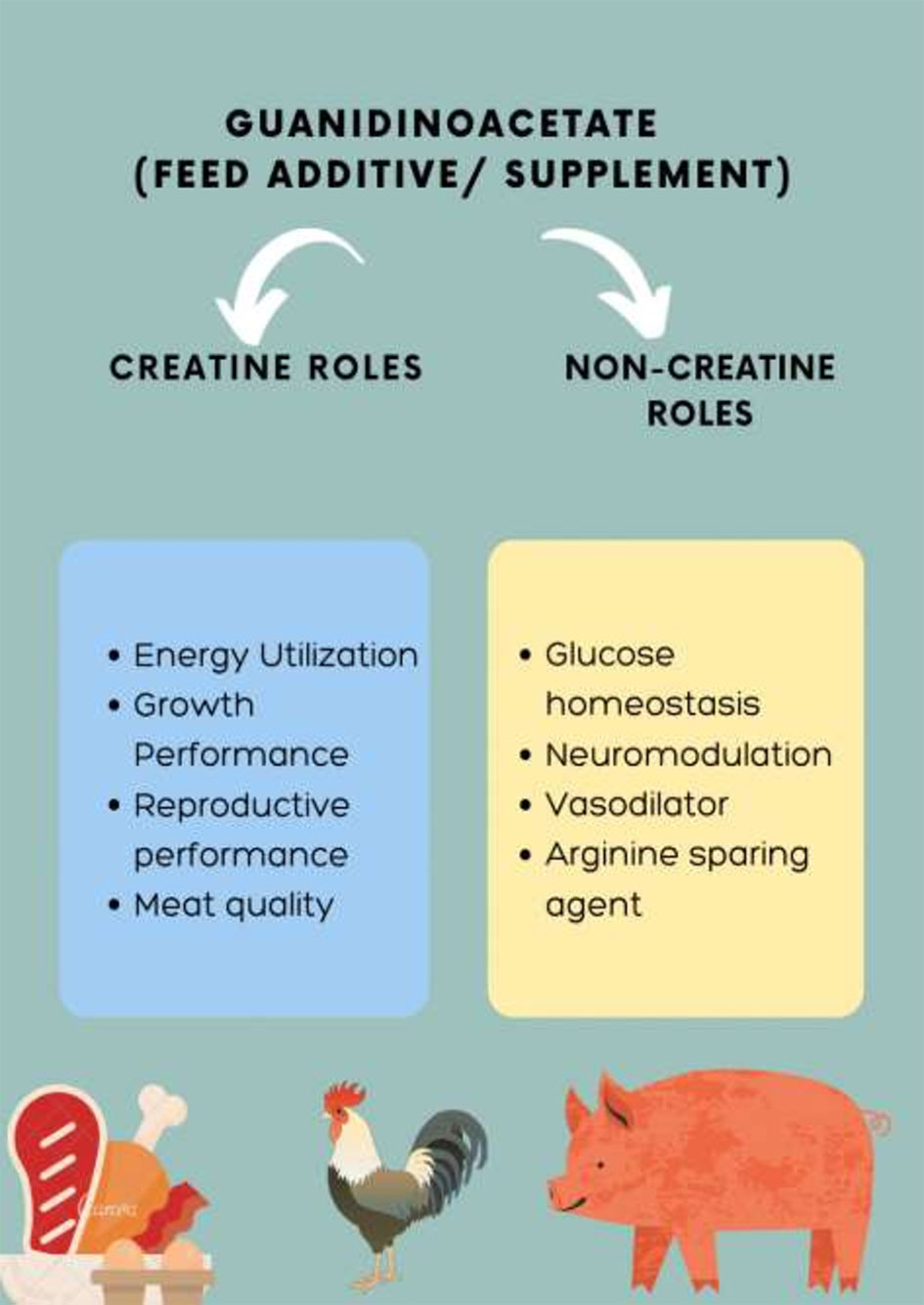Shandong Efine pharamcy Co.,ltd produce glycocyamine for many years , high quality , good price. Let us check the important effect of glycocyamine in swine and poultry .
Glycocyamine is an amino acid derivative and precursor for creatine which plays a significant role in energy metabolism. However, because of creatine’s instability during the manufacturing process and cost, GAA has been explored as an effective alternative to creatine supplements. GAA has been tested as a potential feed additive to enhance energy utilization and growth performance in the poultry and swine industries. Moreover, GAA has been combined with methionine to improve growth outcomes and may also act as an arginine-sparing agent in birds. The safety of the GAA supplements for animals, consumers, and the environment and its efficacy in numerous livestock species have been proven. This narrative review discusses the scientific evidence regarding the metabolism and effects of GAA supplementation in swine and poultry, identifying the knowledge gaps and future directions for further research on GAA supplementation. A systematic search of the literature identified published research findings related to GAA supplementation in swine and poultry and their findings are summarized in this narrative review to confirm the impacts of GAA supplementation on growth performance, reproductive performance, and meat quality in swine and poultry. Amongst its many demonstrated benefits, GAA is effective at improving body creatine concentration, growth parameters, feed conversion ratio, and performance of animals. Although GAA exerts many non-creatine roles, including the stimulation of insulin secretion, neuromodulation, and vasodilation, further research may require in-depth elaboration.
Importance of GAA as a supplement
Creatine supplements have been used as growth performance-enhancing agents in livestock, because of its role in muscle metabolism. However, due to the supplemental creatine’s high cost, GAA has been tested in animal diets, especially during the later growth periods, when feed consumption is the greatest . Moreover, creatine supplements have other significant drawbacks, including instability during manufacturing and relatively low bioavailability . Guanidinoacetate supplementation has proven to be a stable feed additive in animal feed by the . Moreover, a recent study investigating the stability of GAA in canine food during manufacturing and storing found that granulated and crystallized GAA have high stability compared to added creatine. GAA supplements appear to have twice the solubility of creatine supplements and 40% lesser cost . Therefore, as the only natural precursor for creatine, GAA may be considered a safe and beneficial substitute for creatine.
In animals, GAA has been tested as a potential supplement to enhance growth performance, feed conversion ratio (FCR), meat yield and quality, reproductive performance, and as an arginine sparing agent ( . Although GAA is thought to exert its effects via creatine, GAA supplementation also acts via several other metabolic pathways. For example, GAA can exert direct effects on endocrine functions, neuromodulation, and oxidant-antioxidant processes, which is beyond the scope of this narrative review. Nevertheless, the main effect of GAA is as a precursor for creatine as it can increase creatine stores effectively. Many studies have demonstrated GAA supplementation’s effectiveness in enhancing creatine concentration in muscles liver, kidney, and plasma leading to better growth and performance.
The swine and poultry (broiler) industry aim to achieve the best growth performance with the lowest possible cost and a minor impact on the environment. Therefore, maximizing feed efficiency is important to avoid unnecessary expenses and to minimize the environmental pollution associated with feeding excess nutrients.
As highlighted in this review, research on GAA supplementation has widely expanded in recent years. GAA has been demonstrated to be a safe feed additive or dietary supplement in the commercial animal industry, especially in swine and poultry. Amongst its many demonstrated benefits, GAA, likely via conversion to creatine, promotes growth, physical performance, reproductive parameters, and meat quality, while some non-creatine roles are also evident, but require further research. Although several studies have addressed GAA transport mechanisms in the brain, GAA absorption and transport across the gut are not fully understood and need to be elucidated to fully understand the fate of GAA supplementation. Moreover, more information is needed on the interaction between GAA supplements and dietary methionine and creatine, which can both enhance overall performance. Taking all together, GAA appears to be an effective and safe supplement in animals, and future studies addressing the above issues will further promote GAA use and more clearly target specific functional benefits.
Post time: Oct-30-2023






